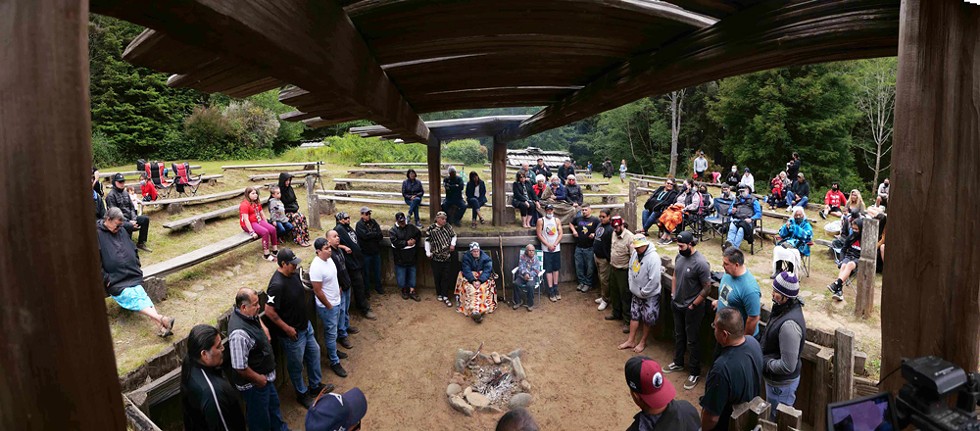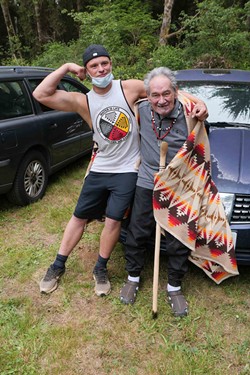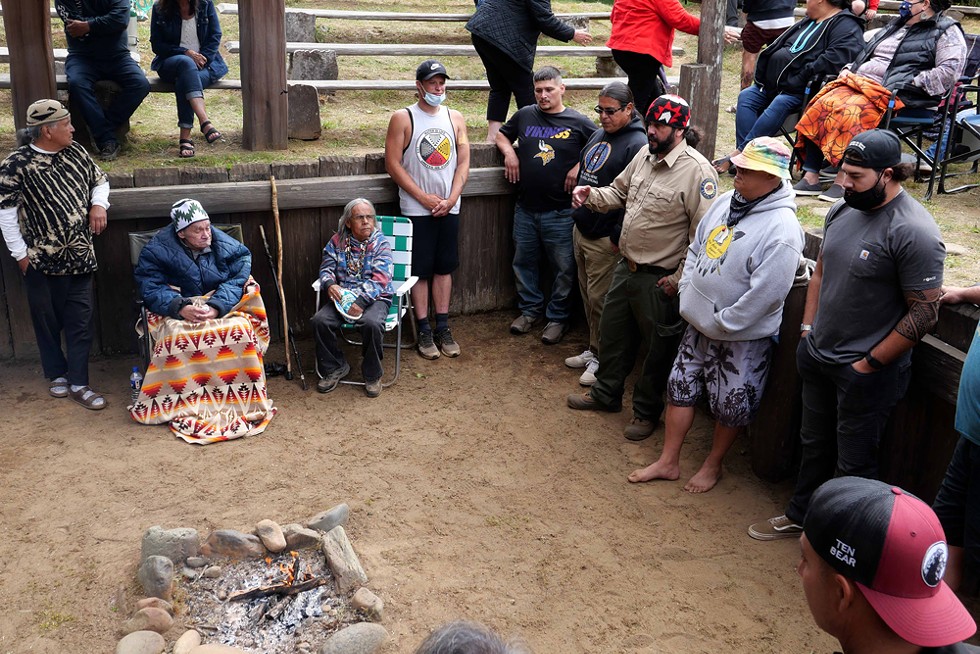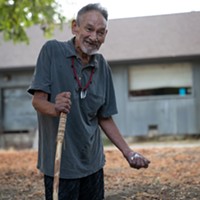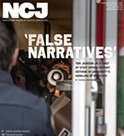'Given These Songs'
Native singers gather to thank Brian Tripp; he thanks them back
By Malcolm Terence[
{
"name": "Top Stories Video Pair",
"insertPoint": "15",
"component": "17087298",
"parentWrapperClass": "fdn-ads-inline-content-block",
"requiredCountToDisplay": "1"
}
]
Brian Tripp, the storied Karuk poet, artist and ceremonial singer, is in hospice, receiving care provided for people who doctors think are in last months of life with an incurable disease.
In many cases, hospice care is cause for abject sadness from the patient and their family. For Brian, it was reason to invite some of the best tribal singers around for a ceremony ministering to the sick.
On a recent fog-shrouded Saturday, they all gathered at Sumeg Village in Patrick's Point State Park just north of Trinidad. The event was as well attended as an outdoor event can be in this nearly-post pandemic time. And Brian, as he often does, shared the spotlight with the wider community.
Journalistic ethics require that I disclose that Brian, or BDT as he is called, is a close friend to me and my family. Stepping further from ordinary ethics, I can't promise to be objective. No one who attended the event could, as we all seemed swept away.
Brian was raised on the coast where his father worked as a logger, even though his parents come from the old Karuk village Ka'tim'îin, near the present town of Somes Bar, along State Route 96, where the Salmon River spills into the much larger Klamath.
(The spelling of Ka'tim'îin is drawn from the Karuk Dictionary as authored by William Bright, the revered linguist going back to the 1950s, and Susan Gehr, the contemporary researcher, who was among the guests at the Sumeg event.)
The village was long a site of many ceremonies, from the coming of age ceremonies and healing ceremony known as the Brush Dance to the world renewal ceremonies, such as the Jump Dance and the White Deerskin Dance held in early fall.
"When I was growing up, the dances had gotten a little rowdy — a lot of drinking, a few fights," Brian said in conversations after the event. "The last Brush Dance happened in 1955 but my family brought it back to Ka'tim'îin. We'd attend Brush Dances still held in Klamath on the coast and others still held in Hoopa."
Brian and his brothers helped restore the Brush Dance to Somes Bar.
"This younger generation has made it a whole different scene," he said. "The dance families won't put up with alcohol abuse. All our songs are prayers and you wanted to make sure you had the best singers. The term was, 'We hired them out,' maybe a jar of salmon or a load of firewood or a nice necklace."
In our conversation, Brian seemed to enjoy recalling the early days.
"I grew up in Klamath," he said. "I knew the Yurok and the Karuk and some of the Hupa dancers. I wish I could think of them. I remember a few — Frank Douglas and Jimmy George and Merkie Oliver. Old Man Sam Jones. Some of these guys who just came to Sumeg are grandkids of those old time people. Grant Pilgrim. Grant was the one who sang that song when I went to the army. It was a Brush Dance song. "
Brian served for two years, with four months in Vietnam, and came home with boils on his face from exposure to the herbicides called Agent Orange. He took jobs as a choker setter and then signed up as an art student at Humboldt State University. Along the way he married a woman named Dolly Kellog and they had a son, Jasper Edward Tripp.
Brian began dancing in ceremonies in his 20s, then also singing in them in his 30s and moved upriver to Orleans, back in Karuk country, over a decade ago.
He has made art in many directions. Besides the music, he has excelled as a painter and poet. Sometimes he is drawn to found objects as a sculptor. To visit his Orleans place was to come face-to-face with his rock collection. "They're just pieces I picked up because I discovered that they had faces and a personality," he said. "I'd make them bodies with tree parts with sticks for hands. Suddenly, there they were, staring at me."
I asked Brian if the rock people had ceremonies but it appeared he had dozed off. When he stirred, he thought that over and laughed, then returned our conversation to the gathering at Sumeg.
"You're given these songs," he said. "For some reason I was attracted to them when I was young. It was fun, watching the dancers come in with all their feathers and regalia. I'd watch them getting ready; I'd get up close."
At the Sumeg event last week, there was a small crowd of all ages, from elders to babes still in parents' arms. The older kids, the ones who might in ordinary circumstance drift into "is-it-over-yet?" restlessness, sat silent, as transfixed and attentive as the rest of us.
The singers were not dressed in regalia and many spoke before they sang, paying tribute to Brian and the way that his generation brought back ceremonies from an era in which they were almost lost to the negative influences of forced assimilation, and the alcohol abuse and loss of Native language that often came with it.
The singers stood lined inside the Sumeg dance area, a large area excavated almost 5 feet deep and lined with hand-hewn lumber, after the fashion of a traditional Native house. A small fire smoldered in the center.
Brian sat there in a folding chair, warmed by a large blanket to insulate him from the chill coastal air and the occasional gust.
Then a singer, after speaking, would begin to sing and it was suddenly another world. At some cue, invisible to me, the other singers would all begin a rhythmic chant, a kind of chorus and then, at some other cue, a singer, sometimes two, would jump into the center and begin a crouched dance.
Some, when they "jumped center," would pick up a stick and dance with it. In ceremonies with traditional regalia, they might hold aloft a short spear with obsidian point or some other object of reverence.
Dewey Jones, one of the Yurok singers in the circle, said he first heard Brian sing when he was 5 or 6 years old.
"I remember going to the Ka'tim'îin Brush Dance and hearing Brian sing the Heavy Song, the opening prayer song," he told those gathered. "When Brian sang you could not only hear it but you could feel it in your soul. Brian inspired me as a singer and he continues to inspire the Native community with his singing, art and poetry. I thank Brian for keeping the Karuk, Yurok and Hupa traditions alive.
"I learned to sing from my grandfather, Jimmy James," Jones continued. "My grandfather could speak fluent Yurok. He was a Yurok traditional leader and well-known singer, hunter and fisherman. My grandfather used to say songs were given to us from the Great Spirit for healing. My grandfather's songs date back to a time before Columbus came to America."
Then Jones began to sing, the chorus joined and two singers jumped center. One grabbed a short stick from the fire, still smoldering at one end. I was transported, the cold breeze seemed to vanish and maybe the hair stood on my arm — I didn't notice. I don't think I was alone.
One of the few non-Indians at the event not related to a singer was Mark Johnson, a professor of art at San Francisco State University. He taught at HSU in the 1980s and first met Brian in 1984. He remembered that Brian immediately invited him to his studio and Johnson invited Brian to dinner.
He said Brian began attending HSU as an art student in 1968, after Vietnam, and by 1975 was featured among other Native artists in a catalog released by Jerry Brown, then in his first term as California's governor. Brian's work made the cover.
Johnson reeled off a long list of major American museums where Brian's art is displayed, calling Brian one of the "strongest California Native American artists." He also lamented that art critics too often focus on white artists and overlook Native talent.
"The most important may be the early 20th Century basket weavers," he said, singling out Louisa Keyser, Washoe, and Elizabeth Conrad Hickox, Wiyot and Karuk, respectively, as "maybe the most important artists in California history."
Turns out that one of the dancers in the circle was Tyler Conrad from Somes Bar. Tyler said Hickox was great aunt to Tyler's grandfather, Willis Conrad. He said Hickox's reputation for making high quality baskets persisted in his family. Her baskets were in high demand by collectors and provided a source of income when money was scarce for Native families.
Tyler and Brian have long had a symbiotic relationship in which Brian is often a mentor and Tyler cared for Brian as he has grown older.
Tyler grew up at the Conrad ranch next door to Ka'tim'îin.
"Since before I can remember, it's always been an obligation to help with dances," he said. "Even the trails around my home are ceremony related."
Turning his attention to Brian, Tyler said, "No payment could repay Brian for all he's given me as an artist." When I talked to him after the Sumeg event, Tyler was reverentially visiting Brian where he's been living in McKinleyville while in hospice care, the apartment of Sonny Tripp, Brian's nephew, who works as an Indian education counselor for middle and high school students and as a basketball coach. Tyler said the place had the atmosphere of a household where valuable regalia is stored.
Sonny was also part of the circle at Sumeg and remembers that it was "Uncle," his sobriquet for Brian, who first took him to a Brush Dance at Ka'tim'îin when Sonny as 7 or 8 years old. Brian moved to Sonny's place in early December as his health declined. A nurse from hospice visits him there at least once a week.
Brian's presence there has brought a stream of visitors, some wanting to say good byes, probably, and more than anything just bask in his company.
"I'm pleased to be an Indian man and see our community honor one of our people, who happens to be my uncle," Sonny said. "It's like McKinleyville's Grand Central for Indians and Uncle's white friends, as well. They bring traditional food, their love, their songs, their good wishes, cards, Ka'tim'îin Schmidt, dice, dominoes. I had to stop poker because I was losing too much money. I feel really blessed to have this place. I feel honored to take care of Uncle and he's been taking care of us. Every day is a good day here."
Ka'tim'îin Schmidt, for the uninitiated, is a local gamblers' card game played in Karuk circles with an uncountable number of cards and incomprehensible set of rules. Willis Conrad, Tyler's grandfather, took me to play it once decades ago, the night before ceremonies, near the dance house there. I won a lot of money despite my white-guy ignorance to Willis' delight and the hostility of the other card players at the table. (That evening of card playing became the title chapter of a book I wrote later titled Beginner's Luck.)
Several women singers also joined the Sumeg event. One of them was Pimm Allen, Brian's niece and an academic advisor at HSU. I'd last seen her when she showed up one evening at the McKinleyville home with a giant platter of cooked steelhead.
Her roots there go deep. She talked about Brian's mother Violet May Donohue, who herself was taken from her family as a child and sent to a boarding school far from home. In the 1950s and 1960s Violet was part of a group of Native mothers and Aunties who felt that there was a need for university education "for our people." They started the Indian Tribal Education Personnel Program, called ITEPP, and helped start United Indian Health Services.
Pimm and the other women singers earned and were accorded great respect at the Sumeg event, which Pimm said was typical of the great mutuality in tribal ceremonies. She is proud of the role that Brian, her father and her uncles have played in the restoration of ceremonies, which had nearly disappeared a few generations ago.
"There was a lot — loss of land, kids sent off to boarding schools, much more — many people found it hard to assimilate," she said. "They didn't have a way to cope. It was both a gift and a handicap. You could see the pain in the community when you saw that rowdiness." As people from that generation healed their wounds, my kids have grown up without drugs and alcohol.
It was Brian and others in his generation, she said, who worked to restore what had been lost.
"As all of us in my generation, we're thankful for what Brian and his generation did for all of us and we're trying to carry the torch into the future," she said.
It wasn't always easy, reflecting Professor Johnson's comment on society's neglect of non-white artists. "I got kicked out of every studio I ever had," Brian said. "I couldn't pay the rent. I was homeless for two or three years, moving back in forth in Eureka for a while and then in Weitchpec, so I wouldn't wear anyone out. From there I went to the Intertribal Friendship House in San Francisco for rehab."
Two years ago the Alliance for California Traditional Arts awarded Brian the California Living Heritage Award, just the third time it had given the award in the organization's 20-plus year history.
Brian's brother David invited us to come and I agreed, even though I had no idea Brian or the award were any big deal. Brian doesn't put on "great artist" airs or play the I'm-hot-stuff card. Brian was our good buddy. That was plenty.
But when I arrived, I discovered I was one of 200 guests, at least half of them Native. When time came for Brian's acceptance speech, instead of the self-congratulation customary at such events, he and his niece Pimm invited singers in the room to the stage and they sang in turn for nearly an hour.
It was the best award event ever and typical Brian.
He often turns the conversation back to his family and says his parents and his brothers all worked for community and family instead of just for themselves. His oldest brother Leroy drove all kinds of trucks and focused on family. The next in age was the late Amos Tripp, an attorney who became legal advisor for United Indian Health Service. Brian was the third-born and the fourth brother David taught psychology at College of Redwoods in Hoopa. The youngest brother Phillip lives in the Bay Area and at one point stayed home and cared for his wife's elderly parents.
It was the same story last week when Brian, talking about Sumeg, insisted it wasn't about him.
"They came to sing for me but it wasn't just for me," he said. "It was for everyone. To me, looking at what we can all do is what we're all about. Nobody does it all by themselves. It took all these people when I was growing up, letting me handle the feathers, letting me take it all in."
Malcolm Terence (he/him) is the author of Beginner's Luck: Dispatches from the Klamath Mountains and co-editor of Free Land, Free Love: Tales of a Wilderness Commune. Before he moved to the Black Bear commune in 1968, he was a newspaper writer in Los Angeles.
Speaking of...
-
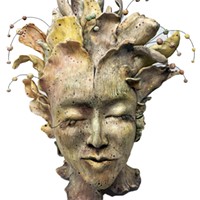
Lily Haas' Muse is Nature
Jul 11, 2024 -
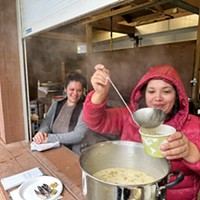
'Our Food is Our Medicine'
Mar 28, 2024 -
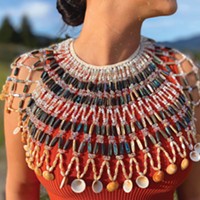
The Reluctantly Famous Shoshoni Hostler
Feb 15, 2024 - More »
more from the author
-
From Orleans to the Capitol
Spreading Good Fire
- Dec 2, 2021
-
Fighting Fire with Fire
A devastating wildfire season highlights the need for prescribed burns
- Nov 5, 2020
-
Spreading the Gospel of Good Fire
Officials bring in artists to aid controlled burn messaging
- Oct 31, 2019
- More »
Latest in News
Readers also liked…
-
Through Mark Larson's Lens
A local photographer's favorite images of 2022 in Humboldt
- Jan 5, 2023
-
'To Celebrate Our Sovereignty'
Yurok Tribe to host gathering honoring 'ultimate river warrior' on the anniversary of the U.S. Supreme Court ruling that changed everything
- Jun 8, 2023
